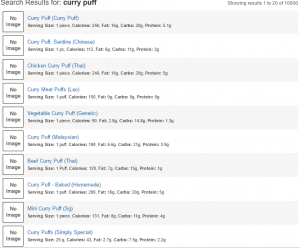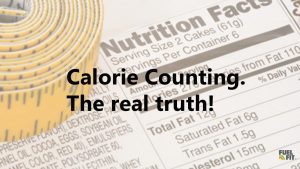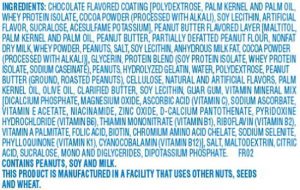How accurate are the values provided in your Calorie Counting App & are you Cheating yourself? 😮
Imagine this scene: You just downloaded a fabulous (as reviewed) calorie counting app with great reviews. You just had a curry puff from your favourite hawker stall for breakfast. You key in the word “Curry Puff“. And the following screen is what you get:
The following conversation could be something similar that goes through in your mind. 🙂
“Gosh! The first option says 246 calories. Hey, but wait, the auntie who sold the puff to me is Malaysian so that accounts for my puff being a “Malaysian” curry puff which is only 190 calories. Hey But wait! It looks smaller than a usual curry puff, so it should be a “Mini Curry Puff” which is only 131 calories! Wow! Good on me on choosing the healthier curry puff of all! Hey wait, there are another 10,000 listings on Curry puff!”
Great future in counting calories I say!
Why shouldn’t we view food as a collection of calories?
-
Not all calories are equal: Not only does calorie counting take away the enjoyment from eating; it cannot distinguish from good and bad calories.[1] Calorie-focused thinking is biased against high-fat foods, some of which may be protective against obesity. For example, coconut oil is one of the weight-loss friendly fats which have powerful effects on metabolism.
- Disregards the nutritional qualities of the food: Think comparing one egg vs three pieces of cheese crackers, even when the total amount of calories is similar!
-
Fatigue: Reducing your food intake by counting in terms of calories can leave you hungry and tired simply because you are not consuming the nutrients your body needs.[2]
-
We all have different metabolism rates: The amount of calories to be consumed by an individual does not necessarily apply to everyone! We are all different, and there are many other factors affecting the amount of calories the body uses a day, such as hormonal sensitivity and how your body works to ensure optimal survival conditions.
-
You don’t necessarily lose weight: While some find calorie counting apps useful in helping them lose weight, others might actually gain weight instead! This is because having a net zero in calories every day, does not guarantee weight lost, and not all calories consumed are absorbed.[3] Furthermore, while some might lose weight, they could be even more unhealthy in terms of their bodily functions due to the lack of nutrients (refer to “You are more than a number on the weighing scale”).
How do I eat healthily instead?
Labels such as the one below will really make us wonder what exactly we are consuming.
Confused? You probably need a scientific dictionary to understand what you are eating from the above label.
FuelFit recommends you to take note of the types of food that you are eating; in particular, reducing your intake of heavily processed foods (certain packaging might trick you into thinking that the product is lower in calories and healthier, but are essentially processed).
WARNING:
Besides being extremely low in essential nutrients, heavily processed foods are also loaded with preservatives, colorants, flavour and texturants which can cause severe health problems if consumed frequently![4] During processing, the fiber found in whole foods that helps relieve constipation is also often lost or even removed. Sometimes, synthetic vitamins and minerals that are difficult to digest are added to compensate for what was lost.
You should try your best to check the ingredient lists on food packaging to know what you are really consuming.
Less focus on numbers, and more of eating real food. The more you try to count calories, the less likely you are going to enjoy the food in front of you (think looking at a spreadsheet on the plate!)
The FuelFit team encourages you to eat in moderation, to consume more whole foods and make healthier food options every day.
[1] http://time.com/4071440/calorie-counter/
[2] http://www.livestrong.com/article/454212-fatigue-while-on-a-calorie-restricted-diet/
[3] http://modernhealthmonk.com/low-calorie-myth/
[4] https://authoritynutrition.com/9-ways-that-processed-foods-are-killing-people/



